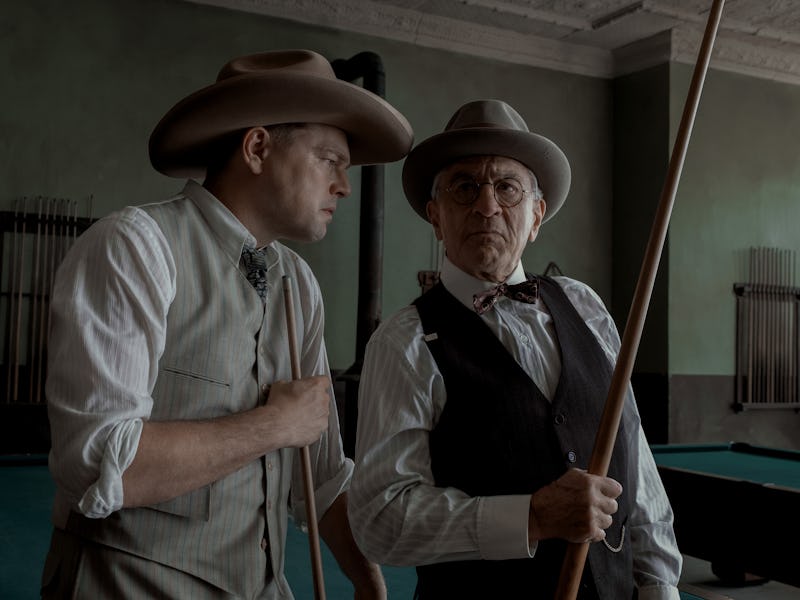2023 Was the Year of “Dudes Don’t Rock” Movies
What happens when directors beloved for their films of male camaraderie turn a critical eye back on themselves?

2023 was the year that dudes didn’t rock. In fact, it was the year that dudes found themselves being mercilessly held accountable in a slew of movies that took an astonishingly clear-eyed view of the actions of men in power. Whether it was the atomic angst of Oppenheimer, the banal evil of Killers of the Flower Moon, the impotent fury of Napoleon, or the capitalistic pressures of Ferrari, the dudes, in other words, were not all right. But the most interesting thing about these movies being made about how dudes didn’t rock, was that they were mostly being made by “dudes rock” directors. Let me explain.
What exactly do I mean by a “dudes rock” movie? The phrase itself entered the pop culture lexicon in 2018, as a sort of self-aware meme that ironically referred to men bonding over wholesome but objectively stupid activities. Gradually, that irony turned to sincerity, as it became a kind of antithesis to the more insidious “boys club” mentality that had come to characterize the harmful workplaces and environs of the Me Too movement. “Dudes rock,” at least, was harmless — the only harm these dudes were doing when they harmonized the Halo theme song in a bathroom or cracked a cold one with the boys was to their own dwindling brain cells.
With its sensationally-staged action and its tale of male camaraderie and rivalry, Heat is considered a quintessential “dudes rock” movie.
So it was natural that with the phrase would come a “dudes rock” movie canon. Movies that were generally accepted “bro movies” like Heat or Hard Boiled were a natural fit for this kind of “guys being dudes” attitude, as were the works of directors like Michael Mann, Martin Scorsese, Christopher Nolan, and Ridley Scott. All directors who, in 2023, would make movies that would come to challenge their “dudes rock” status in extremely fascinating ways.
Oppenheimer arguably kicked off this year’s most interesting trend, with Christopher Nolan taking on the story of the creator of the atomic bomb right on the tail of his most “dudes rock” movie, Tenet. But despite Oppenheimer’s mostly morose approach to one of the most terrifying achievements in human history, the film is set up almost like your typical “dudes rock” movie: a genius excelling in his career gets to assemble a murderer’s row of cool scientists. There’s an undeniable excitement in the scenes when Cillian Murphy’s J. Robert Oppenheimer assembles his team for the Manhattan Project, a feeling that gets compounded by how Nolan makes active callbacks to his own superhero movie past. But that feeling soon gets crushed by the weight of Oppenheimer’s guilt over what he’s wrought, and by the film’s own increasingly somber tone. Genius might have won the United States the war and turned Oppenheimer into a historical icon, but — as Oppenheimer muses to Einstein in the film — maybe they destroyed the world by doing so. It’s the kind of self-reflective subversion of the “dudes rock” mentality that makes Oppenheimer such a potent embodiment of this trend.
Oppenheimer offered a sobering counterpoint to “dudes rock” with its story of a man crumbling under the weight of what he’s wrought.
Scorsese’s Killers of the Flower Moon would take this subversion up a notch. Shot and structured like the gangster movies that Scorsese has become synonymous with, Killers of the Flower Moon deliberately plays with the expectations audiences have for a “dudes rock” movie. But by making its lead characters undeniably evil, Killers denies us the kind of catharsis that Scorsese’s old “dudes rock” gangster movies might have given us. From the start, Leonardo DiCaprio’s Ernest Burkhart is a greedy, weak-willed, and pathetic murderer who exploits the very woman that he’s sworn to love — a sorry excuse of a man who nonetheless earns some of our empathy because he’s granted so much of the movie’s POV. But Killers of the Flower Moon never deigns to offer him any sympathy. Scorsese is aware of how many of his films are considered an incremental part of the “dudes rock” movie canon, and with Killers of the Flower Moon, he rejects that.
Ridley Scott’s Napoleon and Michael Mann’s Ferrari offer different variations on the anti-”dudes rock” movie. Scott turns the historical conqueror into Europe’s greatest cuckold, while Mann takes a remarkably unromantic approach to the story of car manufacturer Enzo Ferrari. Scott is the closest to letting dudes rock a little, thanks to Napoleon’s epic battle scenes and brutal feats of war, but counteracts it by allowing Joaquin Phoenix to play Napoleon like a weird little man eternally on the verge of a temper tantrum. But it’s Mann’s Ferrari that offers a sobering punctuation mark on the year that dudes didn’t rock, with a harrowing film that offers little solace to the great men who just want to drive fast.
Ferrari reveals what moral compromise can do to a dude who just wanted to build fast cars.
So what does it mean that these former “dudes rock” directors like Scorsese, Mann, Scott, and Nolan, are suddenly turning a more critical eye back on their own works? It doesn’t mean the end of wholesome movies about feats of masculine camaraderie — Tom Cruise will keep that genre alive, even if it kills him. It just means that these former dudes have evolved, and the movies have with them. And that rocks.